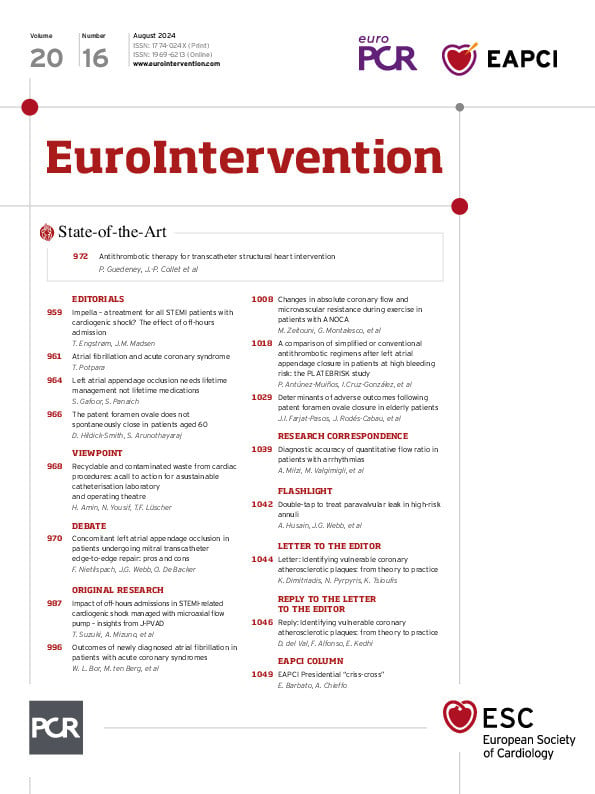Prompt reperfusion is pivotal for improving prognosis in patients with ST-segment elevation myocardial infarction (STEMI)1. Thus, admission and revascularisation of patients with STEMI occur 24/7, owing to the unpredictable and acute nature of the disease. Yet, the time of admission may entail considerable significance for prognosis, a phenomenon called the off-hours effect2. The term refers to patients admitted at night or at weekends, and contemporary data suggest a worse prognosis for off-hours admissions compared to on-hours2. Intuitively, this tendency may be further accentuated in the most severe and acute STEMI cases, namely those in cardiogenic shock (CS).
CS is the most severe presentation of STEMI and bears a 50% mortality rate1. It is characterised by tissue hypoperfusion owing to myocardial ischaemia and subsequent left ventricular dysfunction. Consequently, the use of mechanical circulatory support (MCS) to ensure haemodynamic stability through the unloading of the left ventricle has been of great interest. Until recently, randomised trials evaluating various MCS devices have failed to show prognostic benefit in STEMI complicated by CS1. Yet, the newly published Danish Cardiogenic Shock Trial (DanGer Shock) showed a 13% absolute risk reduction in all-cause mortality at 180 days in patients with STEMI and CS who were treated with a microaxial flow pump (Impella [Abiomed]) compared to those with no MCS3. Whether the use of a costly Impella with potential complications is justified in every case is, however, debatable.
In addition to the risk of complications, patients with CS who are treated with Impella require an increased level of care including specialists in cardiac intervention and admission at a cardiovascular intensive care unit. Any device-related complications will further necessitate specialist post-implant care3.
In this issue of EuroIntervention, Suzuki et al investigate the prognostic influence of admission time in patients with STEMI and CS who have been treated with Impella4. Of 566 patients admitted between February 2020 and December 2021, 47% were admitted off-hours, defined as between 8:00 p.m. and 07:59 a.m. on weekdays, at weekends, and on holidays. Data were obtained from an ongoing Japanese multicentre observational registry (J-PVAD) comprising patients with STEMI and CS treated with Impella. Apart from door-to-balloon and door-to-unit time, all baseline characteristics were similar between groups. In the off-hours group, the door-to-balloon time was 103 minutes and the door-to-unload time was 90 minutes, which were significantly longer than the on-hours group (88 and 77 minutes, respectively), but neither were independent predictors of 30-day mortality. Interestingly, although complication rates between on- and off-hours were comparable, patients admitted during off-hours had a higher 30-day mortality (35.7% vs 24.3%; p=0.004), and off-hours admission was an independent predictor hereof.
In general, the findings of a suggested impact of the off-hours effect in patients with STEMI and CS are conflicting, potentially caused by heterogeneous definitions of off-hours56. Nonetheless, the poorer prognosis associated with off-hours admissions, despite comparable complication rates, warrants careful consideration. One plausible explanation may be a variation in the threshold for Impella implementation between off-hours and on-hours. Thus, off-hour clinical circumstances are characterised by fewer resources, and consequently, patients treated with Impella during off-hours may, on average, have declined more before the decision to escalate to MCS. This timepoint may be beyond the point of treatment effect. Additionally, a patient receiving Impella needs careful attention, and the overall care of patients in CS implicates meticulous treatment decisions in terms of inotropes, dialysis, etc. These aspects influence mortality and may be better taken care of during on-hours.
Suzuki et al provide valuable insights into vulnerable patients as their study is a prospective analysis of consecutive patients with STEMI in CS treated with Impella. Notably, the DanGer Shock Trial remains the sole randomised trial addressing Impella use in this context3. We are therefore curiously awaiting post hoc analysis of this trial stratified by admission time. Until then, the present study emphasises the importance of addressing off-hours admissions, which may have minimal impact in an all-comer STEMI population but are critically influential if CS develops. The authors deserve commendation for their significant work with a large, consecutive cohort where minor improvements can have a substantial impact.
Conflict of interest statement
T. Engstrøm reports speaker fees from Novo Nordisk, Boston Scientific, and Abbott; as well as advisory board fees from Novo Nordisk and Abbott. J.M. Madsen has no conflicts of interest to declare.

